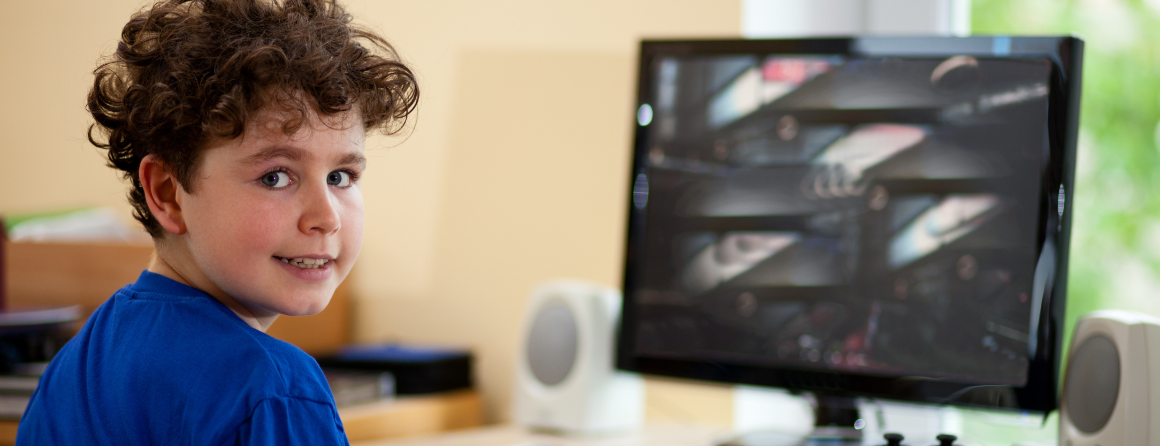Heavy TV and computer use impacts children’s academic results

Grade 3 students who watch more than two hours of TV daily or spend more than one hour a day on a computer experience a decline in academic results two years later, a new study has found.
The research led by the Murdoch Children's Research Institute and published in PLOS ONE, found heavy TV use at 8 to 9 years of age impacted on reading, equivalent to a loss of four months in learning by 10 to 11 years and heavy computer use predicted a similar loss in numeracy.
Murdoch Children's Dr Lisa Mundy said the effects of electronic media on physical and mental health have received much attention but this new study linked its use to academic performance.
The study recruited 1239 children from the Childhood to Adult Transition Study (CATS) whose academic performance was measured in Grade 3 and later in Grade 5 using the National Assessment Program – Literacy and Numeracy (NAPLAN) results.
The research found Grade 3 students who watched more than two hours of TV a day or used a computer for more than one hour a day predicted a 12-point lower performance in reading and numeracy at Grade 5 compared with their peers who consumed less.
It also found watching more than two hours of TV a day in Grade 5 was associated with 12-point lower numeracy and reading scores, and using a computer for more than one hour a day with a 14-point lower numeracy result than their peers.
There was no evidence of short or long-term links between videogame use and academic performance, despite finding that one in five children did not play videogames in Grade 3, whereas by Grade 5 this increased to one in four. A quarter played more than one hour of video games a day in Grade 3, which increased to nearly a third in Grade 5.
Dr Mundy said electronic media use had become the most popular leisure-time activity for children but could affect primary school academic performance by reducing physical activity, sleep or time spent on homework and had the potential to diminish concentration.
"The mid-primary school years are a time when academic difficulties are often first evident and predictive of lower academic performance and school dropout later," she said. "These middle years are also a time when children's electronic media use dramatically rises and children have more say over the media they consume."
Murdoch Children's Professor George Patton said the findings carried implications for parents, teachers and clinicians to consider the type and timing of TV and computer exposure in developing media plans for children.
Professor Patton said the data was also timely given the move to remote learning due to COVID-19 and raised important issues around the best way for students to transition back into classrooms.
"This question about the effects of modern media on children's learning has never been more important given the effects of the pandemic on children's use of time," he said. "It underlines again the importance of children moving safely back into classrooms and face-to-face learning with their teachers.
"Minimising the risks from the spread of COVID-19 as well as re-engaging with students will undoubtedly be a challenge for all schools. At the same time as maintaining social distancing, changing timetables and establishing new hygiene routines, teachers will need to facilitate each student's re-engagement with classmates and learning."
Researchers from the University of Melbourne, University of South Australia and the University of Helsinki also contributed to the study.
Publication
Lisa Mundy, Louise Canterford, Monsurul Hoq, Timothy Olds, Margarita Moreno-Betancur, Susan Sawyer, Silja Kosola and George C Patton. 'Electronic media use and academic performance in late childhood: A longitudinal study,' PLOS ONE. https://journals.plos.org/plosone/article?id=10.1371/journal.pone.0237908
*The content of this communication is the sole responsibility of Murdoch Children's and does not reflect the views of the NHMRC.
Available for interview
- Dr Lisa Mundy, Murdoch Children's Team Leader Adolescent Health
Media contact for Murdoch Children's
- See our Media Centre
About Murdoch Children's
The Murdoch Children's Research Institute is the largest child health research institute in Australia committed to making discoveries and developing treatments to improve child and adolescent health in Australia and around the world. They are pioneering new treatments, trialling better vaccines and improving ways of diagnosing and helping sick babies, children and adolescents. It is one of the only research institutes in Australia to offer genetic testing to find answers for families of children with previously undiagnosed conditions.
Funding
The study was funded by the National Health and Medical Research Council (NHMRC) (grant app 1010018), Dr Lisa Mundy was partially supported by the Invergowrie Foundation and Professor George Patton was supported by a Senior Principal Research Fellowship from the NHMRC.
